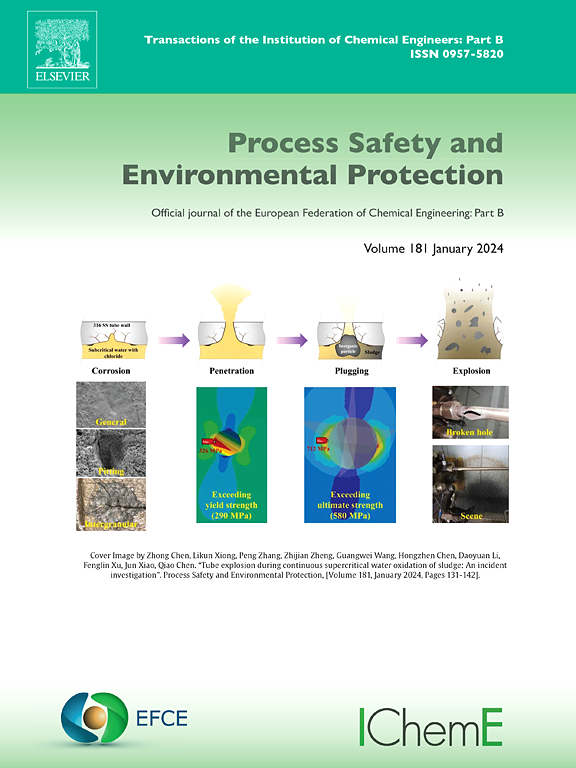Scenario generation and aggregation to enhance resilience assessment in chemical processes using dynamic simulations
IF 7.8
2区 环境科学与生态学
Q1 ENGINEERING, CHEMICAL
引用次数: 0
Abstract
An integrated resilience assessment framework for chemical process systems (CPSs) is proposed to address limitations in disturbance-scenario selection and multi-scenario analysis within existing dynamic simulation-based methods. The framework first employs a signed directed graph (SDG) to generate multi-source disturbance scenarios from safety-critical variables (SCVs), thereby ensuring comprehensive and accurate scenario identification. Next, process dynamic simulation models are established, with time-varying process parameters used to depict how system performance evolves under different disturbances. Finally, by weighting individual resilience indices according to disturbance frequencies and scenario occurrence probabilities, the framework yields a clear quantification of overall system resilience. When applied to a methanol–water distillation process, the proposed method precisely captures the system’s inherent resilience under routine disturbances in dynamic response and scenario adaptability. This work provides a systematic theoretical methodology for resilience assessment of complex systems, laying a solid foundation for subsequent decision-making and design optimization considering process resilience. It provides effective support for mitigating process safety accidents induced by operational disturbances and reducing system risks.
使用动态模拟的情景生成和聚合以增强化学过程的弹性评估
针对现有基于动态仿真的方法在干扰情景选择和多情景分析方面的局限性,提出了一种化学过程系统(cps)综合弹性评估框架。该框架首先使用有符号有向图(SDG)从安全关键变量(scv)生成多源干扰场景,从而确保全面准确的场景识别。其次,建立过程动态仿真模型,采用时变过程参数来描述系统性能在不同扰动下的演变。最后,通过根据干扰频率和场景发生概率对个体弹性指标进行加权,该框架可以清晰地量化整个系统的弹性。当应用于甲醇-水蒸馏过程时,该方法能准确地捕捉系统在常规扰动下的动态响应和场景适应性的固有弹性。本研究为复杂系统的弹性评估提供了系统的理论方法,为后续考虑过程弹性的决策和设计优化奠定了坚实的基础。它为减轻操作干扰引起的过程安全事故和降低系统风险提供了有效的支持。
本文章由计算机程序翻译,如有差异,请以英文原文为准。
求助全文
约1分钟内获得全文
求助全文
来源期刊

Process Safety and Environmental Protection
环境科学-工程:化工
CiteScore
11.40
自引率
15.40%
发文量
929
审稿时长
8.0 months
期刊介绍:
The Process Safety and Environmental Protection (PSEP) journal is a leading international publication that focuses on the publication of high-quality, original research papers in the field of engineering, specifically those related to the safety of industrial processes and environmental protection. The journal encourages submissions that present new developments in safety and environmental aspects, particularly those that show how research findings can be applied in process engineering design and practice.
PSEP is particularly interested in research that brings fresh perspectives to established engineering principles, identifies unsolved problems, or suggests directions for future research. The journal also values contributions that push the boundaries of traditional engineering and welcomes multidisciplinary papers.
PSEP's articles are abstracted and indexed by a range of databases and services, which helps to ensure that the journal's research is accessible and recognized in the academic and professional communities. These databases include ANTE, Chemical Abstracts, Chemical Hazards in Industry, Current Contents, Elsevier Engineering Information database, Pascal Francis, Web of Science, Scopus, Engineering Information Database EnCompass LIT (Elsevier), and INSPEC. This wide coverage facilitates the dissemination of the journal's content to a global audience interested in process safety and environmental engineering.
 求助内容:
求助内容: 应助结果提醒方式:
应助结果提醒方式:


